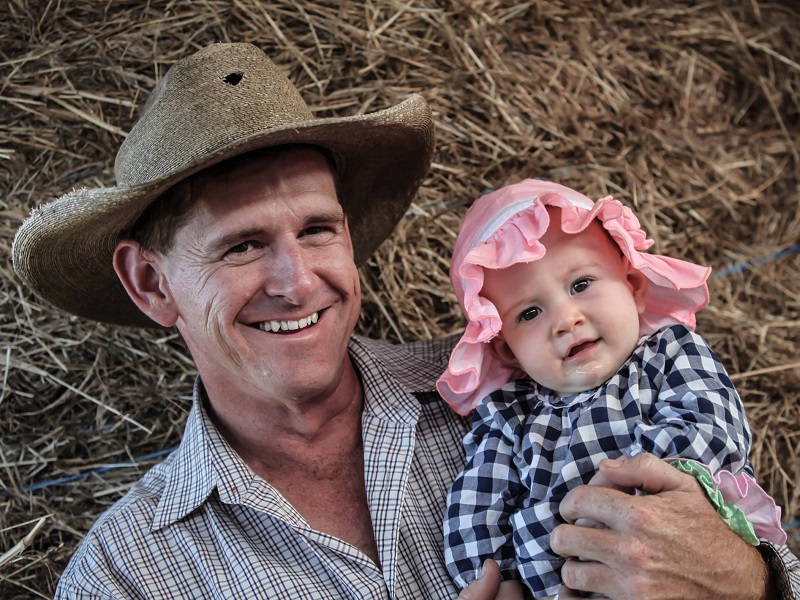
Dennis Donohoe, farm manager with Aminya Pastoral, is a seasoned producer with decades of experience, and his story is a testament to how even minor changes in farming practices can lead to significant improvements in productivity and land health.
Location: 30km north of Mackay, North Queensland
Property size: 172 hectares
Average annual rainfall: 1500mm
Enterprise: Trading
RCS services used:
For North Queensland beef producer Gordon Clarke, the benefits of introducing rotational grazing to his former cane farm could not be more apparent. Since introducing the management system to his 172-hectare home property Tangora, which sits 30km north of Mackay, carrying capacity has been lifted, he has curbed a persistent onslaught of coastal weeds, and he has watched the creeks leaving his boundary run clean throughout wet seasons.
However, beyond transforming his business, Gordon also knows he is doing his part to improve the land for the next generation, including his daughters Andy and Pippa. He is also reducing the sediment run-off reaching the Great Barrier Reef, so it’s impossible to overstate the environmental importance of his work.
“I think about everything we are doing on the land for the next generation,” says Gordon. “I personally hate working with chemicals; the less I have to use them, the better. It’s remarkable how rotating our cattle has reduced the weeds, which has increased the grass cover, and that’s why I think our water is sinking into the country and being filtered before moving into the creeks. “It’s rewarding to think the work we are doing here, even if it’s only playing a small part, is helping the Reef.”

Gordon, who has extensive experience working in the cattle industry, was familiar with some regenerative practices before buying Tangora in 2005, alongside his wife Tanya, and had ambitions of eventually rotating stock. In the beginning, the land was bare, used predominantly for cane production, and had no water or power infrastructure, cattle yards or a house.
Gordon set about installing drastic change, including establishing eight paddocks, planting a diverse range of grasses and legumes and daily stock rotation. At that time, Gordon took valuable advice from his brother, who runs a high-density rotational grazing operation in Far North Queensland.
In late 2020, Gordon’s regenerative journey began after attending an RCS Grazing Clinic at Charters Towers. This clinic was part of the RCS Grassroots Project (Grassroots), which has supported more than 37 grazing businesses within the Fitzroy, Burnett-Mary and Mackay-Whitsunday regions with funding from the Queensland Government’s Reef Water Quality Program. It aims to help producers make practical changes to simultaneously reduce sediment run-off into the Great Barrier Reef while increasing grazing profitability.
Gordon said the RCS clinic fine-tuned his knowledge and left him confident in the productivity potential of Tangora, which was running about 100 head.
“I went to the clinic wanting to know if there was anything I could improve on and came home with the knowledge there was an awful lot to be done,” he said. “The science behind the methodology was clearly explained, and I received some new tools to monitor, not only the grazing side of it but the overall business.”
Being a coastal property, Tangora benefits from 1500mm annual rainfall, which can swell to 2000mm in a wet year, but on the downside, it’s at the mercy of tough, tropical weeds.
Sicklepod and lantana are two predominant pests graziers battle in the Mackay region, but the Clarkes have successfully tackled them with regenerative methods.
“We had a really dry year where we kept the cattle too long, and the country was damaged. After the first rain, all that came back quickly was sicklepod. By rotating the cattle, it has allowed the grass to fight through. The thing with sicklepod is it will only grow where there is bare ground, so keeping the grass coverage high prevents it. With the cattle grazing in a higher density, we have noticed they are trampling the weeds. Even with the lantana, they pushed it down and thinned it out, and it was reduced by half the following year,” said Gordon.
He now plans to utilise RCS grazing charts to ensure his property is stocked in alignment with seasonal conditions to prevent the weed problem from rearing its head.
As part of its holistic approach to the management of grazing businesses, RCS prioritises human relationships, and Gordon said the Clarke family unit has strengthened since moving to regenerative agriculture.
“The grass I have here at the movement is incredible, and it has allowed me not to use chemicals, which is good for my family and me. Anything that flows on from that is terrific, whether that be benefits to my business or the reef.”
“I would say this has happened without me realising it, as Tanya and I are now on the same page regarding the business,” he said. Both Tanya and Gordon also work off-farm, so they rely on each other to keep the wheels of the regenerative plan turning.
“Tanya will remind me when we need to rotate the cattle, or she will be out there shifting them herself,” he said. Gordon is eager to see what the future holds on Tangora for his family. They feel they have five more years of building to do but acknowledge it could go beyond that. The work flows naturally and feels much simpler when the vision is clear and the goals are holistic.
Profitable Paddocks is our educational newsletter sent to your email inbox every quarter.
Click the Bell for the latest blogs.

Dennis Donohoe, farm manager with Aminya Pastoral, is a seasoned producer with decades of experience, and his story is a testament to how even minor changes in farming practices can lead to significant improvements in productivity and land health.
Once you have ownership as to why planning is important, the next ingredient is to work out where and how you will do your planning. When you write something down you change your relationship with the content. I cannot emphasise enough the power of getting your thoughts and plans out of your head onto paper or the computer.
The season in SA and Tassie is particularly tight right now with little or no useful rain since early January and a generally failed 2023 spring prior to that. Right now, across southern Australia and much of the eastern NSW, you won’t need to drive far out into the countryside to see cattle and sheep grazing (and lying on) hay and silage trails lined across paddocks.
Martha Lindstad and partner Robert James are farm managers on ‘Karalee’, Enngonia NSW. Both have travelled different paths to being where they are. Martha is originally from Norway, growing up on a three hectare farm before travelling to New Zealand and eventually the Pilbara in Western Australia. It was here that she saw the benefits of sustainable farming for the country and livestock.
The Prince’s RCS mentor, Raymond Stacey, sees a strong future ahead for Simon and Laura. “The Drought Resilient Soils and Landscapes project is about supporting graziers to manage their country and businesses better,” Raymond said. “I see an operation here where they’re working hard on their planning and putting their plans into action to leave their country, business and people in better shape.”

Join our mailing list
